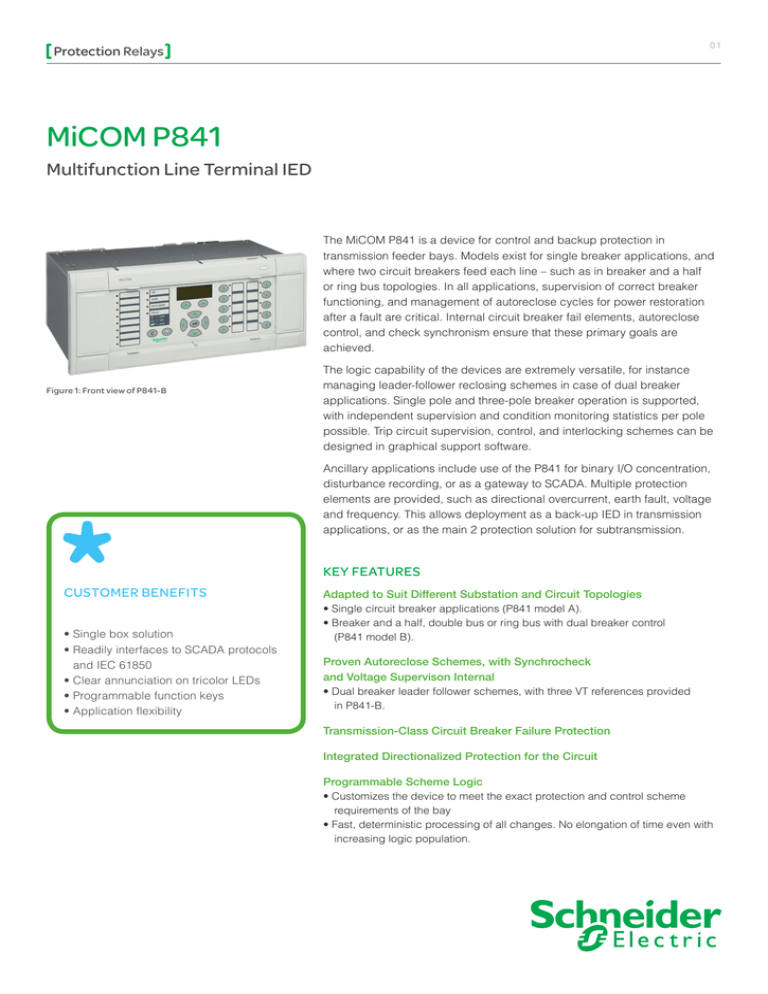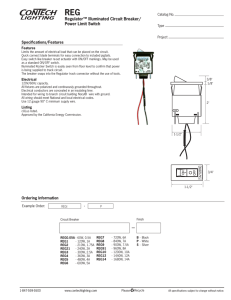
01
Protection Relays
MiCOM P841
Multifunction line Terminal IED
The MiCOM P841 is a device for control and backup protection in
transmission feeder bays. Models exist for single breaker applications, and
where two circuit breakers feed each line – such as in breaker and a half
or ring bus topologies. In all applications, supervision of correct breaker
functioning, and management of autoreclose cycles for power restoration
after a fault are critical. Internal circuit breaker fail elements, autoreclose
control, and check synchronism ensure that these primary goals are
achieved.
Figure 1: Front view of P841-B
The logic capability of the devices are extremely versatile, for instance
managing leader-follower reclosing schemes in case of dual breaker
applications. Single pole and three-pole breaker operation is supported,
with independent supervision and condition monitoring statistics per pole
possible. Trip circuit supervision, control, and interlocking schemes can be
designed in graphical support software.
Ancillary applications include use of the P841 for binary I/O concentration,
disturbance recording, or as a gateway to SCADA. Multiple protection
elements are provided, such as directional overcurrent, earth fault, voltage
and frequency. This allows deployment as a back-up IED in transmission
applications, or as the main 2 protection solution for subtransmission.
kEy FEATURES
CUSTOMER BENEFITS
• Single box solution
• Readily interfaces to SCADA protocols
and IEC 61850
• Clear annunciation on tricolor LEDs
• Programmable function keys
• Application flexibility
Adapted to Suit Different Substation and Circuit Topologies
• Single circuit breaker applications (P841 model A).
• Breaker and a half, double bus or ring bus with dual breaker control
(P841 model B).
Proven Autoreclose Schemes, with Synchrocheck
and Voltage Supervison Internal
• Dual breaker leader follower schemes, with three VT references provided
in P841-B.
Transmission-Class Circuit Breaker Failure Protection
Integrated Directionalized Protection for the Circuit
Programmable Scheme Logic
• Customizes the device to meet the exact protection and control scheme
requirements of the bay
• Fast, deterministic processing of all changes. No elongation of time even with
increasing logic population.
Protection Relays
02
MiCOM P841
FUNCTIONS OVERVIEW
ANSI
IEC 61850
Features
P841-A
P841-B
OptGGIO
Opto coupled logic inputs
16
24
RlyGGIO
Relay output contacts
14
32
High speed, high break contacts available
FnkGGIO
Function keys
LedGGIO
Programmable LEDs (R-red, G-green, Y-yellow)
Optional
10
10
18R/G/Y
18R/G/Y
•
Two breaker configurations
50BF
RBRF
High speed breaker fail (CBs controlled)
1
1 or 2
79
RREC
Autoreclose (CBs controlled)
1
1 or 2
25
RSYN
Check synchronizing
1
2
Clockwise and Anticlockwise phase rotation
•
•
PTRC
Single and 3 pole modes
•
•
50/51/67
OcpPTOC / RDIR
Phase overcurrent stages
4
4
50N/51N/67N
EfdPTOC / RDIR
Earth/ground overcurrent stages
4
4
51N/67N/SEF
SenPTOC / RDIR
Sensitive earth fault (SEF)
4
4
67/46
NgcPTOC/ RDIR
Negative sequence overcurrent
•
•
Broken conductor
•
•
46BC
49
PTTR
Thermal overload
•
•
27
PTUV
Undervoltage protection stages
2
2
59
PhsPTOV
Overvoltage protection stages
2
2
59N
ResPTOV
Residual voltage protection stages
2
2
81U, 81O, 81R
PTUF/PTOF
Under/overfrequency and ROCOF protection
•
•
Alternative setting groups
4
4
Fault locator
•
•
Fault Records
15
15
Event Records
512
512
Fault waveform disturbance records
•
•
VTS
Voltage transformer supervision
•
•
CTS
Current transformer supervision
•
•
Circuit Breaker condition monitoring
1
1 or 2
Trip circuit supervision
•
•
Graphical programmable scheme logic (PSL)
•
•
FL
RFLO
SOE
RDRE
XCBR
TCS
Protection Relays
03
MiCOM P841
Application
Model B may also be used in single breaker
mode to provide a higher binary I/O count.
The P841 model A (P841-A) is used where only one circuit breaker feeds
a line. There will be a three-phase breaker (or 3 x single-pole units) in this
application, and a requirement of no more than one set of three phase CT
inputs, one 3-phase VT, and a single check synchronizing function via an
extra single phase VT.
Model A is in a smaller 60TE case, with model B
full width 80TE.
The MiCOM P841 is supplied with a full suite of
protection and control functions as standard.
The configuration column of the menu is used
to control which functions the user requires in
the intended application, and which may be
disabled. Disabled functions are completely
removed from the menu, to simplify setting.
Choose the P841-B in breaker and a half or ring bus applications, where
control and monitoring of two breakers is required. This allows dual
protection and reclosing logic, including positive identification of any failed
breaker, and leader follower reclosing schemes.
Functional Overview
(Description of ANSI code nos. see Function Overview)
BUS
2nd Remote
comm. port
Remote
comm. port
Local
Communication
Fault Records
Disturbance
Record
Measurements
X
Self monitoring
49
Vref
50/51
50N/
51N
50
BF-2
67
67N
SEF
67N
67/
46
25-2
46BC
79-2
CTS
I
LINE
V
Vref
IEsen
X
IM
27/
59
81
FL
50BF
VTS
59N
79
25
PSL
LEDs
LINE
conventional
signalling
X
BUS
IEC GOOSE
protection
communication
always
model B
optional
available
only
Multifunction IEDs
P841
Neutral Current
from parallel line
(if present)
Figure 2: System Overview of the P841
MiCOM P841:
The perfect complement
to MiCOM main protection
Protection Relays
04
MiCOM P841
Autoreclose and check synchronism
Standard Autoreclose Features
Both P841 models offer high speed transmission-class autoreclose, settable
for single or three pole tripping schemes. The main application possibilities
are listed below:
• Single Pole Autoreclose - One single pole shot, followed by up to three
3-pole shots with independent dead times.
• Three Pole Autoreclose - Up to 4 shots, independent dead times.
• BAR for 2 and 3 phase faults - Logic to decide whether A/R should
proceed for multiphase faults.
• Unlatching - Safety interlock to ensure the CB was closed prior to the
A/R sequence.
• Dead Time Start - Protection Operation, Protection Reset, CB Trip or
Dead Line.
• AR in progress - Segregated indication that a single pole (1P) or three
pole (3P) cycle is in progress.
• Discrimination Timer - To decide whether a fault affecting another phase
during the single pole dead time is an evolution of the trip, or is a new
fault appearance.
Dual Breaker Reclosure and
Check Synchronism
The following additional features are offered in
P841 model B, to permit two breaker reclosing in
a leader-follower scheme:
• Two CB Control - CB1 and CB2 are assigned.
The user selects which is the leader, and which
the follower breaker.
• Individual selection of recloser on or off.
• Follower action - Follows successful close of
the leader, reclosing after a settable delay.
Alternatively the follower may wait to be closed
manually.
• Independent lockout and reset per breaker.
BUS
A
• CB Healthy - Energy monitor to check that the breaker is OK to perform
a close.
• Reclaim timer.
LINE
• A/R successful - Indication of a successful close.
• Sequence counter - Status indication, so that special protection logic
may be assigned for each reclose shot number.
• Reset Lockout - User Interface, CB Close, Select NonAuto, DDB Signal,
Time Delay.
• AR Inhibit - Time delay after manual closing during which autoreclose
is not permitted.
Check Synchronism
• Check synch time - A wait period for check synch to pick up, if not
already OK at the end of the dead time.
B
P841
Model B
C
• Delta V, delta f, angle, t - Four conditions possible: voltage magnitude
difference, slip frequency, angle, and time.
• CS Voltage window - Limiting the CS function to operate only when line
and bus voltages are within a specific range.
• Dead/Live Line/Bus - All setting permutations of dead and live (hot)
reclosing: DLLB, LLDB, LLLB, DLDB.
• AR Immediate - Fast closing possible, without waiting for the expiry of
the dead time. Allows reclosing if the remote end closes successfully first.
• Check on Shot 1 - To decide whether a high speed three pole reclose
(shot 1) can happen without a synchrocheck. This assumes the dead time
is short, and no drift out of phase could have occurred.
BUS
Figure 3:
Dual breaker example application with P841-B,
Control of breakers A and B .
LINE
Protection Relays
MiCOM P841
Circuit breaker fail
The breaker failure protection may be initiated from internal protection within
the P841, and also from external devices. Where external feeder or busbar
protection is applied to trip the two breakers independently, the P841-B has
the ability to initiate the CBF scheme on a per breaker basis. Retripping
and backtripping schemes are supported, as the P841 uses a two-stage
philosophy, all with fast-acting undercurrent checks.
Other protection elements
• Four stages of both phase and earth (ground) fault protection are
provided with a choice of standard IEC and ANSI/IEEE IDMT curves,
instantaneous, and definite-time operation.
• Negative sequence overcurrent, and SEF (0.5% In sensitivity) are also
available.
• Phase under and overvoltage protection functions are available in addition
to residual overvoltage.
• Broken conductor – detects the percentage phase unbalance due to an
open phase condition.
• A thermal replica provides alarm and trip stages, to warn and protect in
the event of prolonged circuit overloading.
• Two stages each are available for phase overvoltage, phase undervoltage,
and residual overvoltage (neutral displacement).
• Four stages of underfrequency and two stages of overfrequency are
provided, plus rate of change of frequency. This permits load shedding
and restoration schemes to be implemented.
Supervisory functions
Voltage transformer supervision is provided to detect loss of one, two or
three VT signals for line VTs. Current transformer supervision is provided to
detect loss of phase CT input signals.
Reclosing, synchronism, breaker fail
and back-up: all in one IED
05
Protection Relays
06
MiCOM P841
Control
User Interface
Integrated user function keys and tri-color programmable LEDs provide a
cost-effective solution for full feeder scheme applications. The ten function
keys operate in two modes, normal and toggled, with an associated LED
for clear indication of the logic status. Typical control, maintenance, and
commissioning options are initiated directly from simple key presses, rather
than the need to navigate a menu.
Hotkey Menu
Trip and close commands are facilitated from front panel “hotkeys”, to allow
direct CB control without the need to navigate a menu. Other in/out, on/off
and enable/disable controls are easily programmed.
Programmable Scheme Logic
Powerful graphical logic allows the user to customize the protection and
control functions. The gate logic includes OR, AND and majority gate
functions, with the ability to invert the inputs and outputs, and provide
feedback. The system is optimized to ensure that the protection outputs are
not delayed by the PSL operation. The programmable scheme logic
is configured using the graphical MiCOM S1 Studio PC software, as shown
in Figure 4. The relay outputs may be configured as latching (eg “Lockout”)
or self-reset.
Figure 4 Programmable Scheme Logic editor
PASSWORD
PROTECTION
Password protection may be
independently applied to the front
user interface, front communications
port and rear communications port.
Two levels of password protection
are available providing access to the
controls and settings respectively.
Protection Relays
07
MiCOM P841
Measurements and recording
Plant supervision
Power System Measurements (MMXU)
Instantaneous and time integrated voltage, current and power
measurements are provided. These may be viewed in primary, or
secondary values.
Trip Circuit Supervision
Supervision of the trip circuit can be implemented
using optocoupled inputs and the programmable
scheme logic.
Fault Location
A fault location algorithm provides distance to fault in miles, kilometres,
ohms or percentage of line length. The proven algorithm used tolerates prefaults loading and fault arc resistance.
CB State Monitoring
An alarm will be generated if there is a
discrepancy between the open and closed CB
auxiliary contacts.
Event Records
Up to 512 time-tagged event records are stored in battery backed memory,
and can be extracted using the communication ports or viewed on the front
panel display.
Circuit Breaker Condition Monitoring
• Monitoring the number of breaker trip
operations
An optional modulated or demodulated IRIG-B port is available for accurate
time synchronization.
Fault Records
The last 15 faults are stored:
• Indication of the faulted phase
• Protection operation
• Active setting group
• Fault location (distance to fault)
• Relay and CB operating time
• Pre-fault and fault currents, voltages and frequency.
Disturbance Records
The internal disturbance recorder has 12 analogue channels, 32 digital and
1 time channel. Approximately 50 records of 1 s duration can be stored.
All channels and the trigger source are user configurable. Disturbance
records can be extracted from the relay via the remote communications and
saved in the COMTRADE format. These records may be examined using
MiCOM S1 Studio or any suitable software program.
• Recording the sum of broken current quantity
(simulating wear, or “interruption duty”)
• Monitoring the breaker operating time
Communication to remote
operators and substation
automation
The wide range of communication options,
including IEC61850, provides interfacing to
almost any type of Substation Automation System
or SCADA System.
Two auxiliary communication ports are available;
a rear port providing remote communications and
a front port providing local communications. An
additional, second rear port can be ordered as
an option. Any of the following rear port protocols
can be chosen at the time of ordering:
• Courier/K-Bus,
• IEC60870-5-103,
• DNP3.0 (EIA-485 or Ethernet)
• IEC61850
Second Rear Courier Port
The optional second port is designed typically for
dialup modem access by protection engineers/
operators, when the main port is reserved for
SCADA traffic.
Protection Relays
08
MiCOM P841
Device Track Record High speed transmission
autoreclose
• Fast breaker fail - imports scheme
experience from MiCOM P821
• Built on the MiCOM Px40 transmission
platform. Sister IEDs: MiCOM P44y
subcycle distance, P54x differential, and
P547 phase comparison
Schneider Electric Industries SAS
35, rue Joseph Monier
CS 30323
F - 92506 Rueil Malmaison Cedex (France)
Tel.: +33 (0) 1 41 29 70 00
RCS Nanterre 954 503 439
Capital social 896 313 776 €
www.schneider-electric.com
NRJED111068EN
As standards, specifications and designs change from time
to time, please ask for confirmation of the information given
in this publication.
Design: Schneider Electric Industries SAS - Sonovision
Photos: Schneider Electric Industries SAS
Printed: Altavia Connexion - Made in France
This document has been
printed on recycled paper.
06-2011
© 2011 Schneider Electric Industries SAS - All rights reserved
• P841-B scheme full functionality
available stand-alone, or integrated
inside P446 distance relay, or in P544
and P546 line differential




